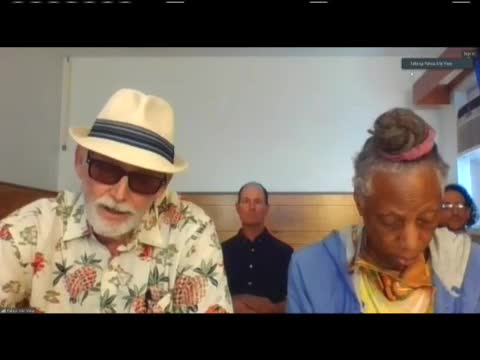Community rallies against controversial development bills
July 10, 2024 | Hawaii County, Hawaii

This article was created by AI summarizing key points discussed. AI makes mistakes, so for full details and context, please refer to the video of the full meeting. Please report any errors so we can fix them. Report an error »

During a recent government meeting, Mayor Roth announced that the California transfer station will now be open on Wednesdays, a decision welcomed by community members who have long advocated for increased access to essential services. The mayor's acknowledgment of community concerns was further highlighted by the support for Bill 140, which aims to protect residents' rights to county services, particularly in Kalapana, where residents have faced service disruptions for over four years.
Carrie Kowalski, representing the Black Sands community, expressed her gratitude for the mayor's decision and emphasized the importance of maintaining access to the transfer station. She raised concerns about potential threats to service continuity if waste accumulates outside the gates of transfer stations, questioning whether similar penalties apply to other locations.
The meeting also featured opposition to Bill 169, with Joel Gimpel, a representative from the Pualani Estates at Kona Homeowners Association, voicing strong concerns about the bill's implications for cultural resources and infrastructure. He criticized the proposed development for failing to address existing traffic and flooding issues, urging council members to reconsider their support for the bill in light of community opposition.
Renee Robinson echoed these sentiments, highlighting the severe traffic congestion in the area and the lack of plans to widen Kukini Highway, which could exacerbate the situation with the addition of hundreds of new vehicles from proposed developments. She also raised environmental concerns regarding the impact on local wildlife and floodplain management.
Maria Jose, a resident of Kaloko Maka, opposed Bill 166, which seeks to subdivide a 20-acre parcel, arguing that such developments threaten the remaining natural landscapes of the island. She urged the council to consider the long-term consequences of allowing developers to encroach on these vital areas.
Cheryl Tanguay, another resident, reiterated the need for careful consideration of the environmental and cultural impacts of proposed developments, particularly in light of the community's historical ties to the land.
The meeting underscored a growing mobilization among residents advocating for sustainable development practices that prioritize community needs and environmental preservation. As discussions continue, the council faces increasing pressure to balance development with the preservation of cultural and natural resources in the region.
Carrie Kowalski, representing the Black Sands community, expressed her gratitude for the mayor's decision and emphasized the importance of maintaining access to the transfer station. She raised concerns about potential threats to service continuity if waste accumulates outside the gates of transfer stations, questioning whether similar penalties apply to other locations.
The meeting also featured opposition to Bill 169, with Joel Gimpel, a representative from the Pualani Estates at Kona Homeowners Association, voicing strong concerns about the bill's implications for cultural resources and infrastructure. He criticized the proposed development for failing to address existing traffic and flooding issues, urging council members to reconsider their support for the bill in light of community opposition.
Renee Robinson echoed these sentiments, highlighting the severe traffic congestion in the area and the lack of plans to widen Kukini Highway, which could exacerbate the situation with the addition of hundreds of new vehicles from proposed developments. She also raised environmental concerns regarding the impact on local wildlife and floodplain management.
Maria Jose, a resident of Kaloko Maka, opposed Bill 166, which seeks to subdivide a 20-acre parcel, arguing that such developments threaten the remaining natural landscapes of the island. She urged the council to consider the long-term consequences of allowing developers to encroach on these vital areas.
Cheryl Tanguay, another resident, reiterated the need for careful consideration of the environmental and cultural impacts of proposed developments, particularly in light of the community's historical ties to the land.
The meeting underscored a growing mobilization among residents advocating for sustainable development practices that prioritize community needs and environmental preservation. As discussions continue, the council faces increasing pressure to balance development with the preservation of cultural and natural resources in the region.
View full meeting
This article is based on a recent meeting—watch the full video and explore the complete transcript for deeper insights into the discussion.
View full meeting
